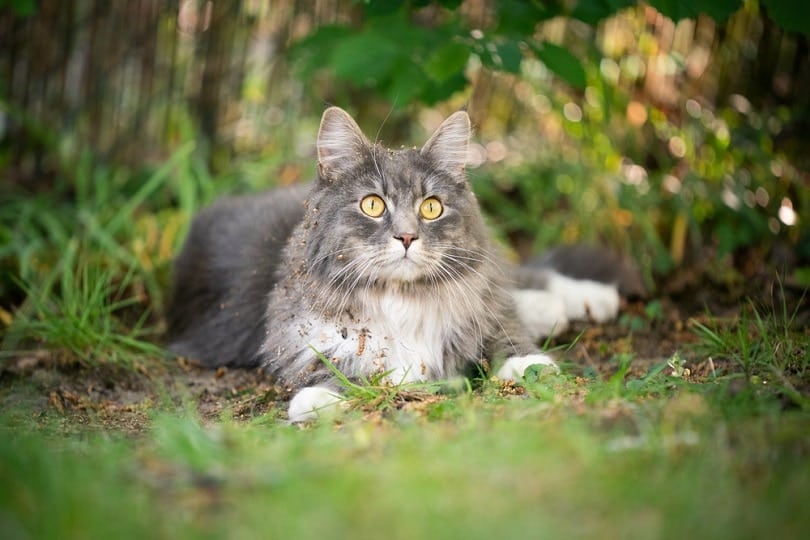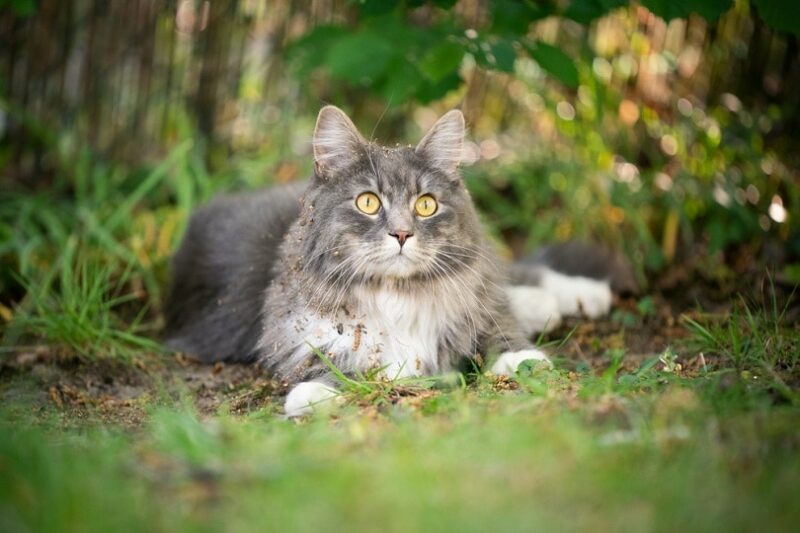Maine Coons are known as the gentle giants of the feline world. They’re gigantic compared to most house cats, reaching weights of up to 35 pounds. The longest Maine Coon ever recorded was measured at 48.5 inches from the tip of their nose to the end of their tail and was immortalized in the 2010 Guinness Book of World Records. Of course, most Maine Coons don’t reach this incredible size, but they’re all pretty sizable felines, nonetheless.
Since many Maine Coons aren’t purebred, it can be challenging to tell. There’s only one way to be certain, which we’ll also discuss. Except for that one definite method, there are several other clues you can use to determine whether your Maine Coon is purebred or mixed.
The 9 Ways to Tell if You Have a Mixed Maine Coon
1. Compare Their Size and Weight
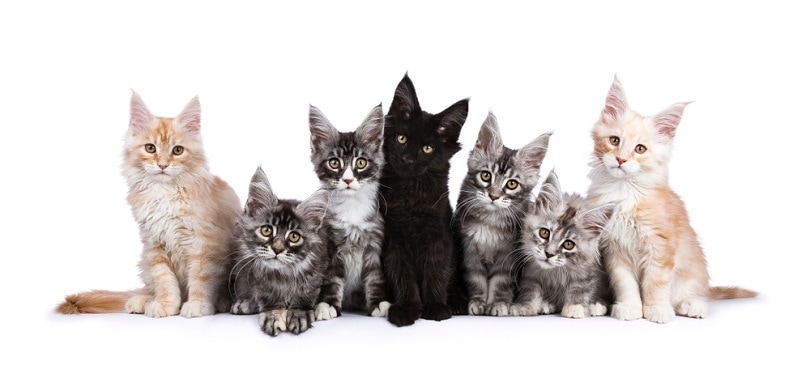
Maine Coons are some of the biggest domestic cats around. To be fair, even mixed Maine Coons will be sizable compared to other breeds, but your cat’s size can give you some distinct clues about their lineage.
In general, purebred Maine Coons will be larger than mixed Coons. While some Maine Coons reach the outrageous weight of 35 pounds, it’s rare. If your Coon weighs over 15 pounds, it’s quite likely that it’s a pure breed Maine Coon. While some mixed Coons can still get that large, it’s much less common.
You can also compare your cat’s height and length. While the largest Maine Coon on record is over 4 feet long from tip to tip, most will be shorter. Still, they can often reach heights up to 16 inches and lengths over 36 inches. If your cat reaches measurements close to these, you can bet they’re purebred.
2. Age of Maturity
Maine Coons don’t mature as quickly as other breeds. They have large bodies and brains that take a long time to develop. As such, you can get a good clue about your cat’s genetics by paying attention to how long it takes them to reach maturity.
Generally speaking, Maine Coons take about 5 years to reach full maturity. But many cat breeds reach maturity much quicker. If your Coon reaches maturity by two or three years old, it’s a good indication that your Coon is a mixed breed.
3. Check Your Cat’s Coat
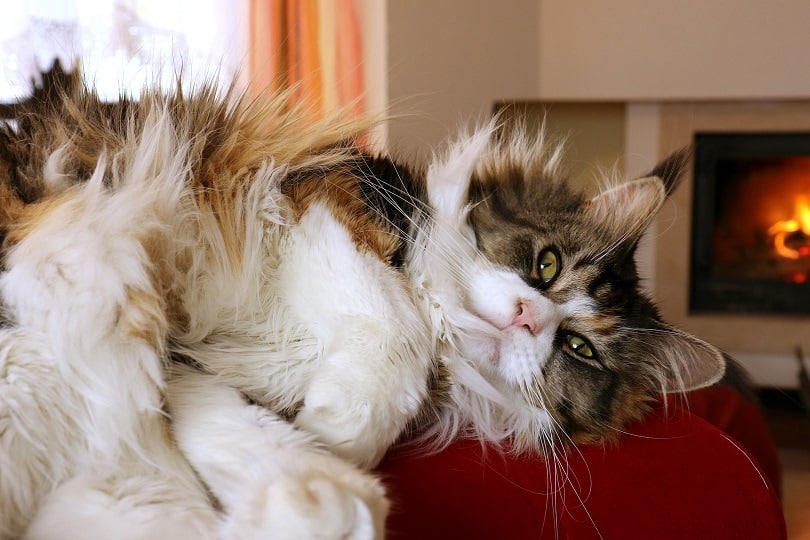
For another clue, you can closely examine your cat’s coat. Maine Coons have quite distinct coats. They’re dual-layered coats with a silky undercoat and long guard hairs. More importantly, purebred Maine Coons have a thick, puffy area of fur around their necks that’s somewhat similar to the mane of a lion.
Mixed Coons can still exhibit this fur ruff, but it’s usually pretty thin in a mixed breed. A pure Maine Coon will have a thick mass of fur that’s unmistakable.
4. Body Shape
Maine Coons are not a streamlined breed. They have thick, rectangular bodies that can make them easier to pick out. If your cat has a streamlined appearance and isn’t stocky and thick, it’s likely a mixed Coon.
Maine Coons have very muscular bodies with broad chests and elongated torsos. While this might be difficult to discern just by looking at your cat, if you compare your cat to pictures of pure Maine Coons, it should give you a solid comparison point to determine whether your Coon’s body shape is that of a purebred cat.
5. Ears and Nose
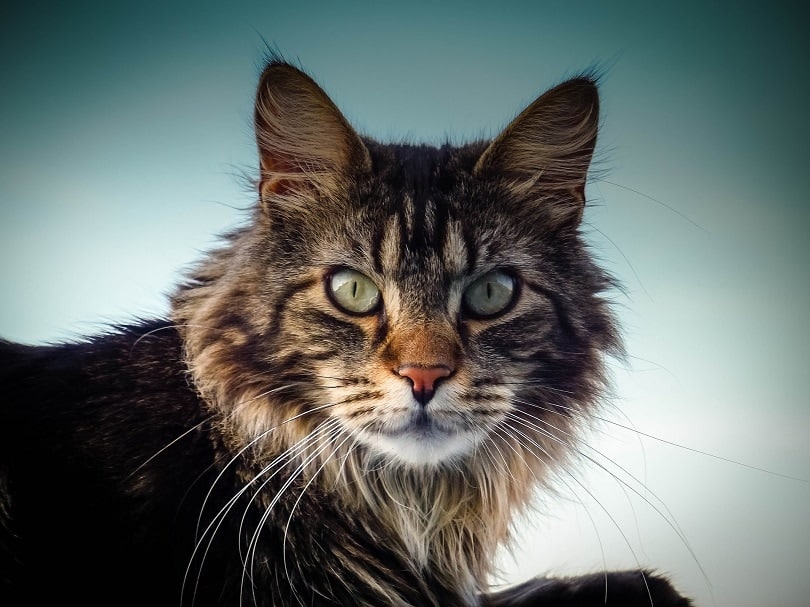
Your cat’s ears and nose can give you more clues to help you determine whether they’re a pure or mixed Coon. Pure Maine Coons have large ears set directly on top of the head. They’re not as pointy as other breeds, though they’re very furry with long hairs on the tips and insides of their ears to keep them warm during freezing cold winters.
If your cat’s ears are set on the sides of their head, or they’re very pointy, your cat is likely mixed. Likewise, if they lack the long tufts of hair on the inside and the tips, it’s likely because your Coon is mixed.
Also, pure Coons have very straight noses, while mixed breeds often have a flat nose. So, if your Coon has a flat nose, it’s probably a mix.
6. Eyes of a Predator
One stand-out feature of Maine Coons is their eyes. Their eyes have a markedly wild look, making them look like the predators they are. Look for eyes more squinted than other cats, making them look devious and cunning.
7. Measure the Tail
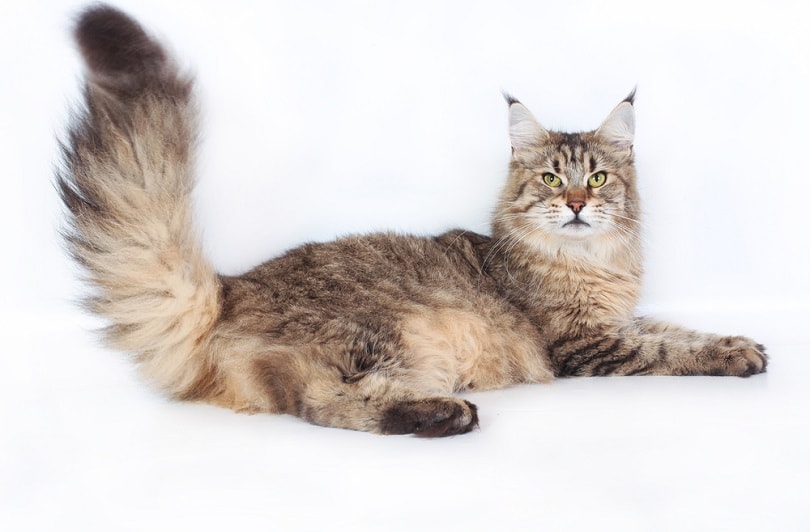
Main Coons have bushy tails that can reach impressive lengths up to 16 inches. They’re full and fluffy, similar to a raccoon’s tail. If your cat’s tail isn’t thick and bushy with fluffy fur, they’re probably a mixed breed. Likewise, if your Coon has a short tail that doesn’t reach at least 10 inches, they’re probably not a pure Coon.
8. Is There an Extra Toe?
This breed has a very specific trait that’s pretty rare in the rest of the feline world. Many Maine Coons have a polydactyl gene, which is a sixth toe on their paws. Granted, not every Maine Coon has this feature, but if your cat does, it’s most likely due to their pure Coon genetics.
9. Genetic Testing
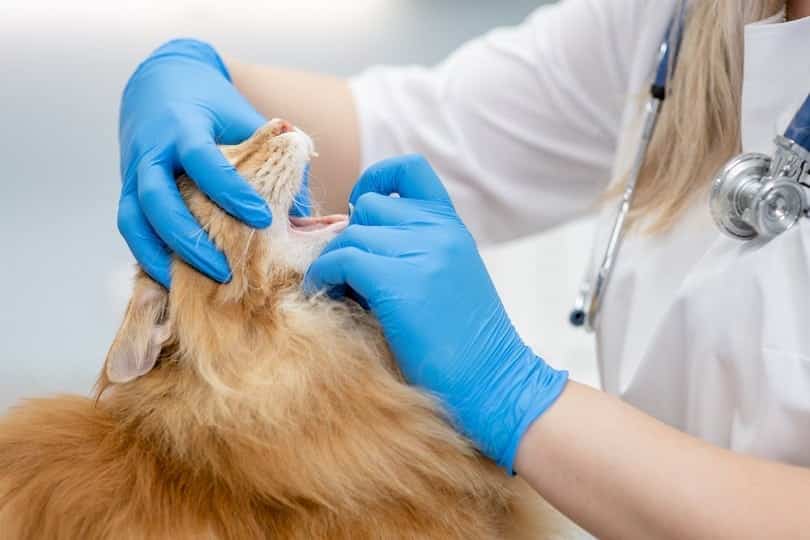
While all of the steps we’ve laid out so far can give you clues as to your cat’s lineage, none are guaranteed ways to make a determination. The only way to be sure is through genetic testing. At one point in time, just a few years ago, this would have seemed like a miracle. But today, it’s an affordable and accessible test to administer.
You can purchase a genetic testing kit from several different companies. You’ll take a small sample of your cat and then send it to a lab for processing. When you get the results, you’ll have no doubt about your cat’s lineage. Even better, you’ll also get information regarding their genetic disease markers and more, illuminating much you probably don’t know about your furry friend.
Conclusion
If you follow these steps, you can gather quite a few clues about your cat’s genetics. These aren’t definitive answers, however. Each step offers you one more clue to complete the puzzle of your cat’s ancestry. If you want to be 100% certain, you can always get an easy at-home DNA test and send it to a lab. When you get the results, there will be no more questions. Short of that, follow each step here and put together the clues until you have an answer .
You might also like:
Featured Image Credit: Nils Jacobi, Shutterstock

